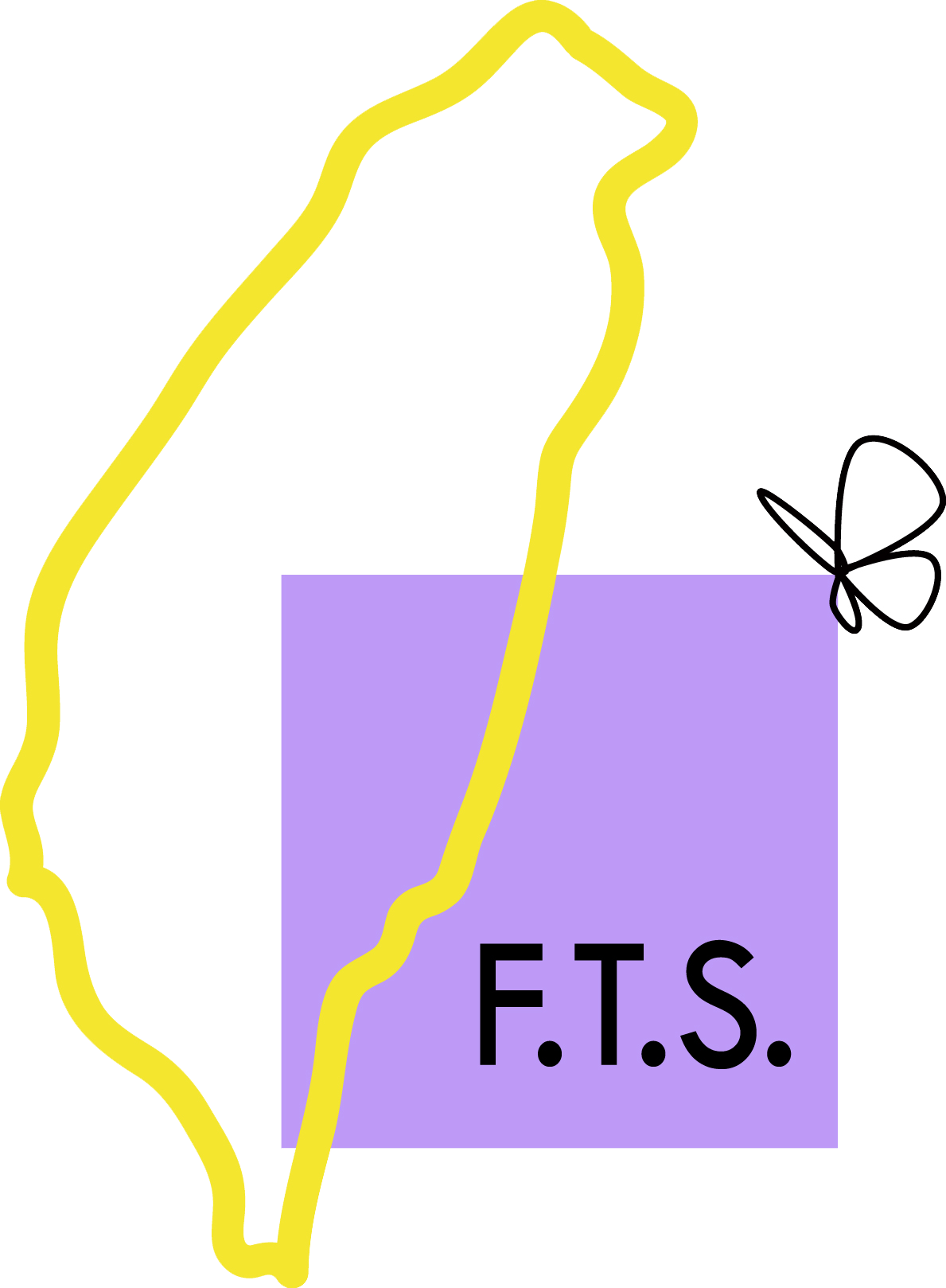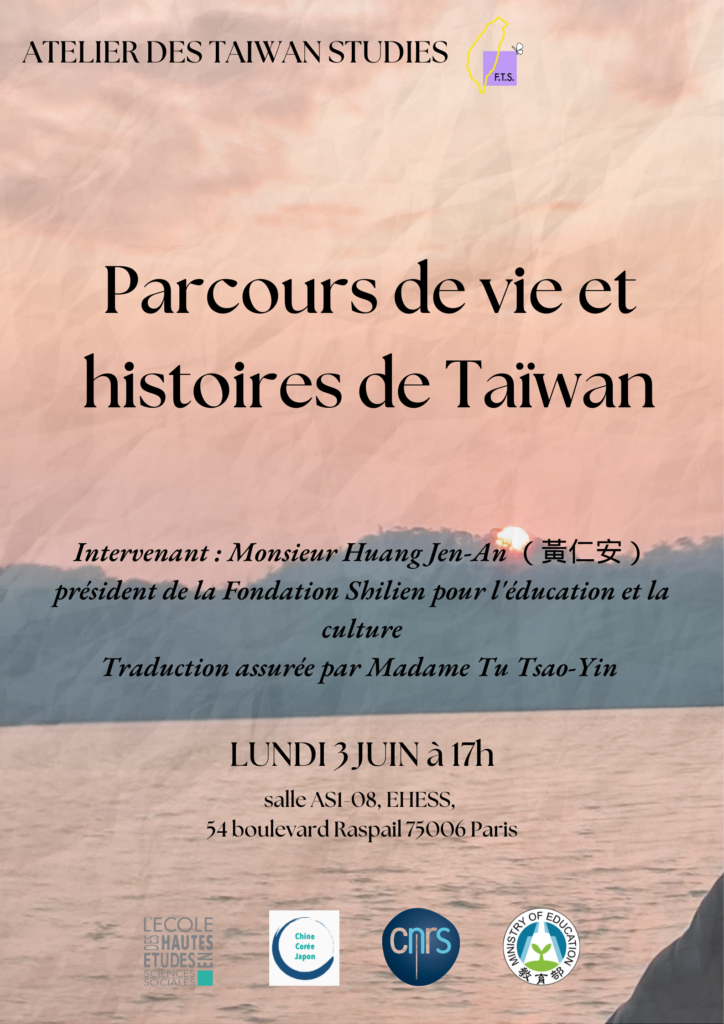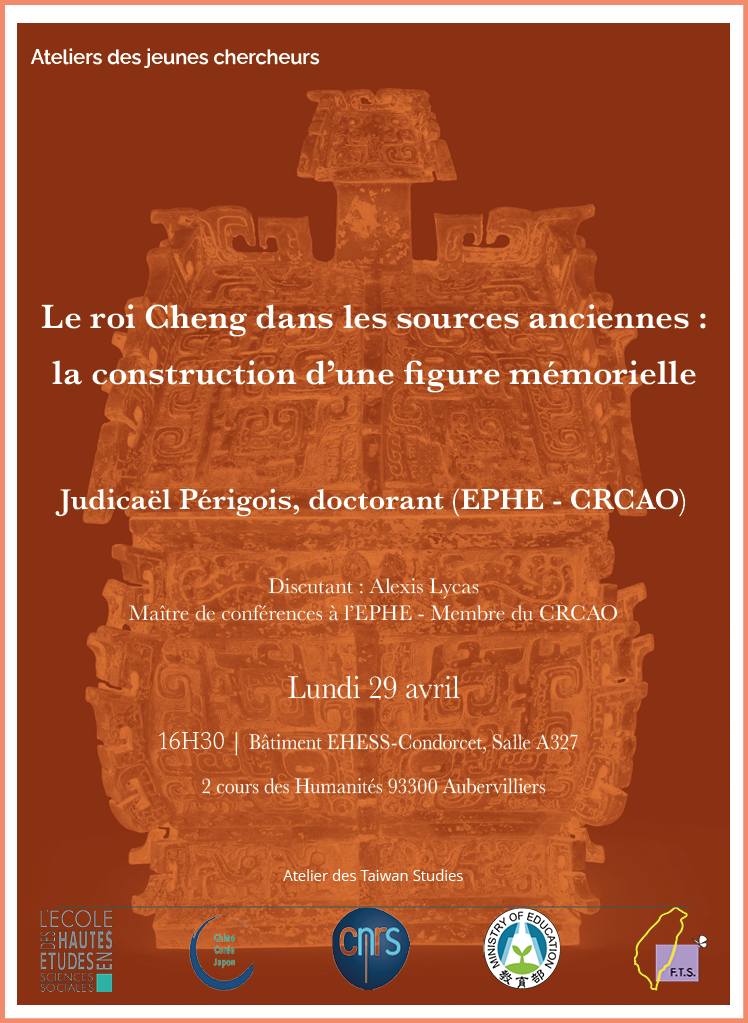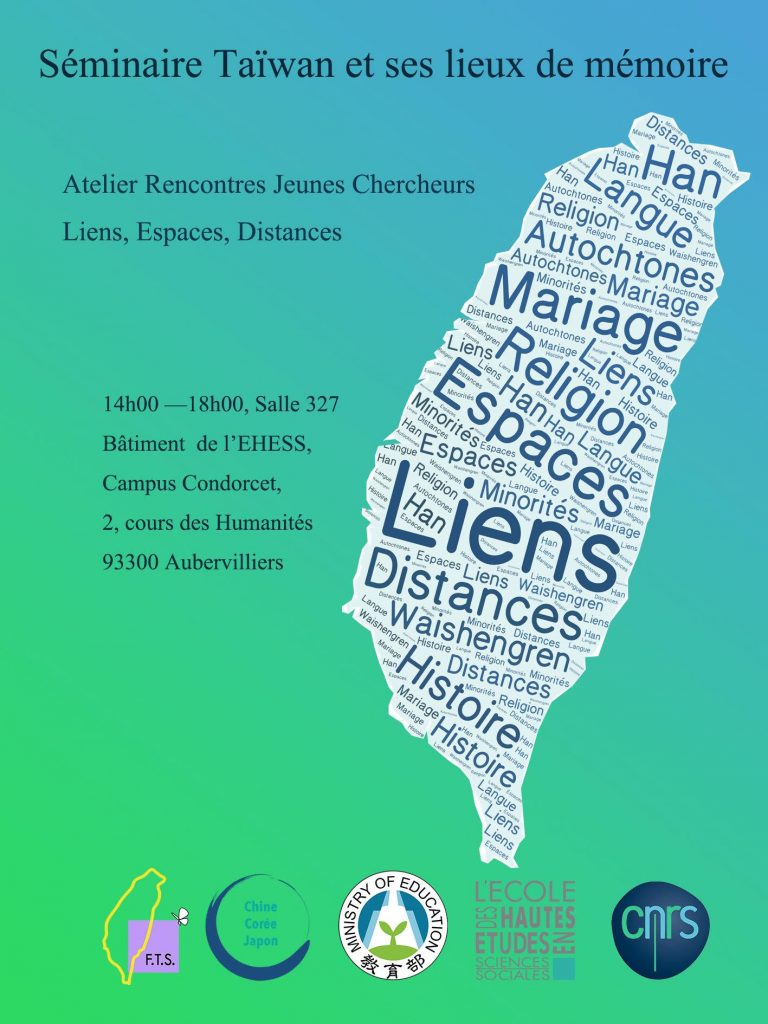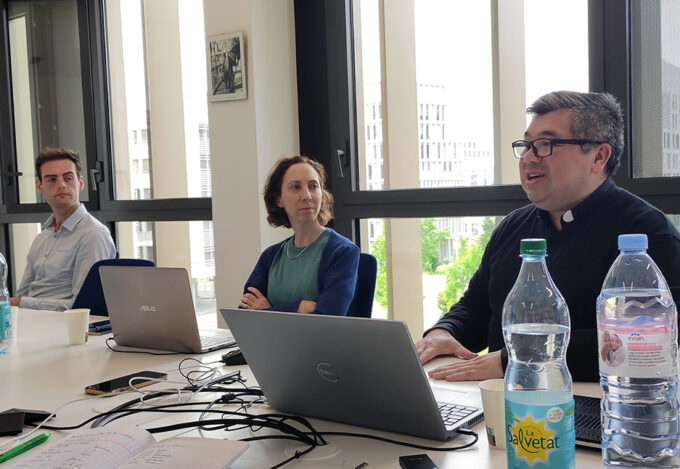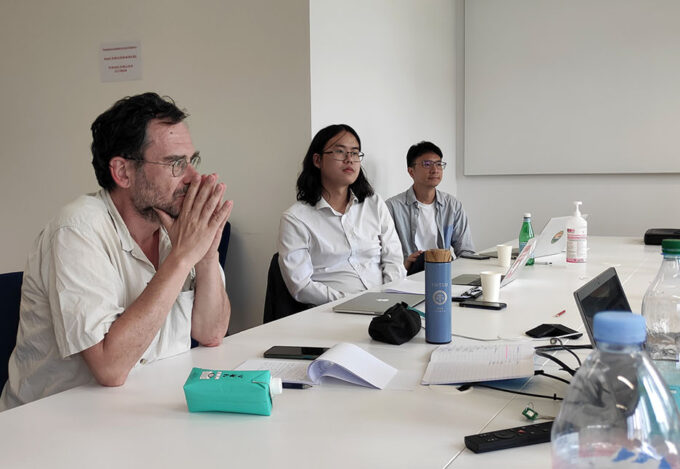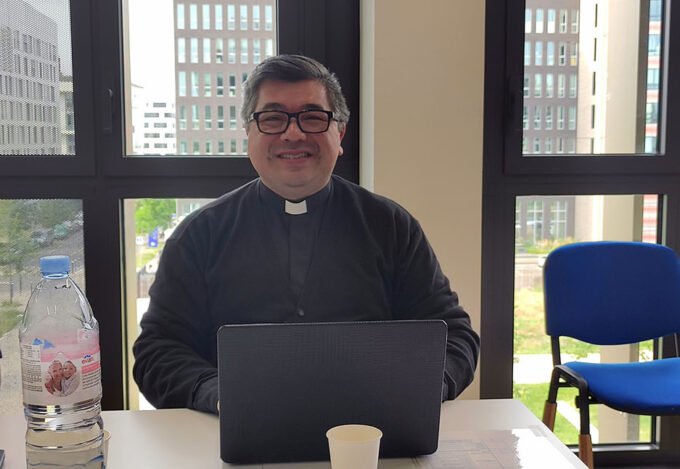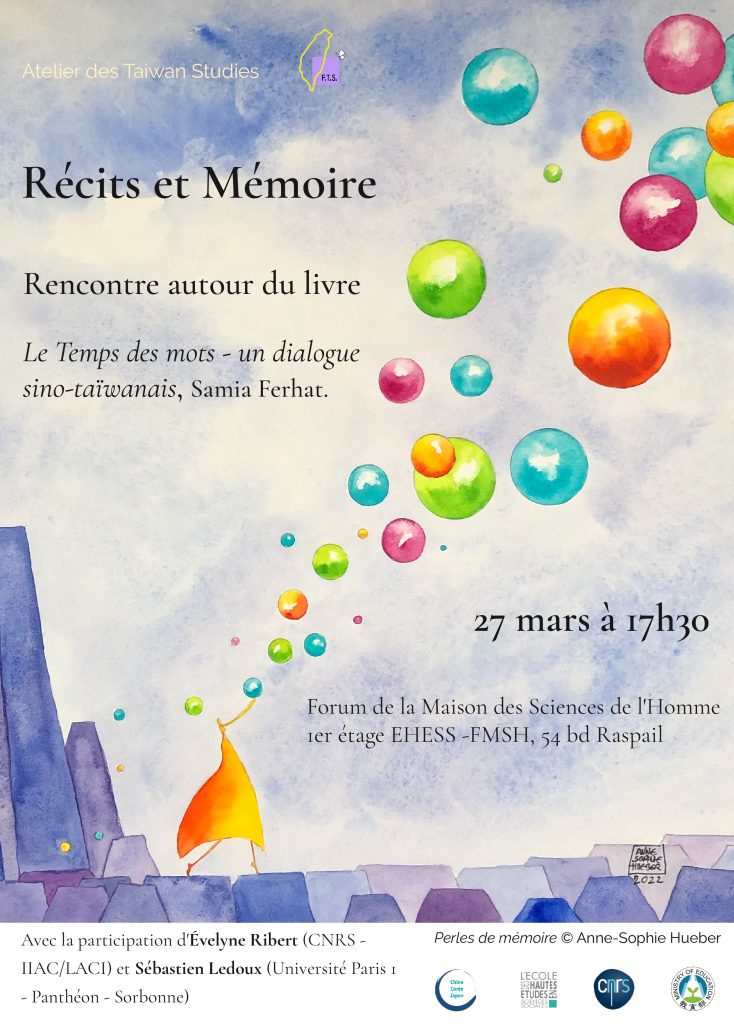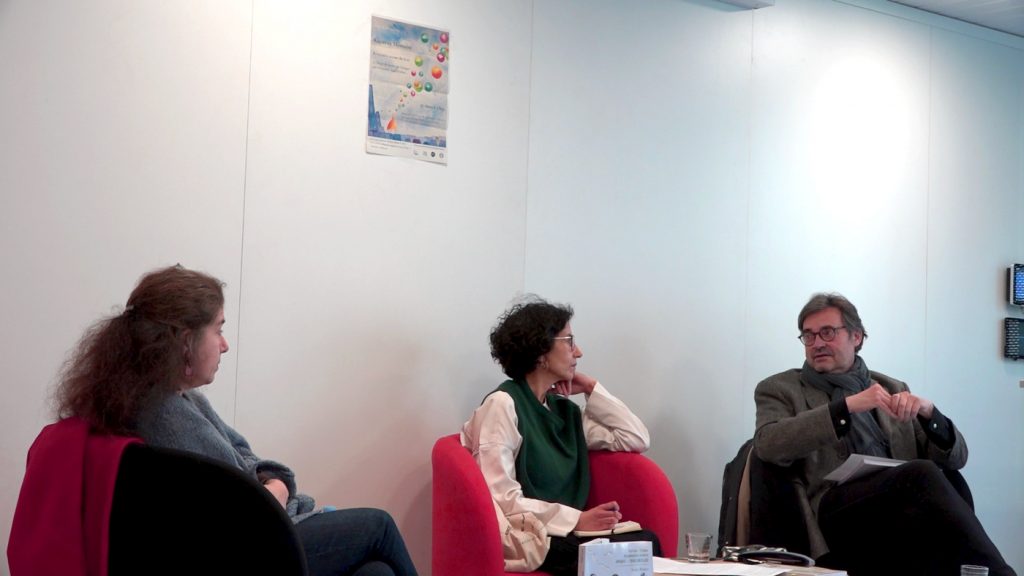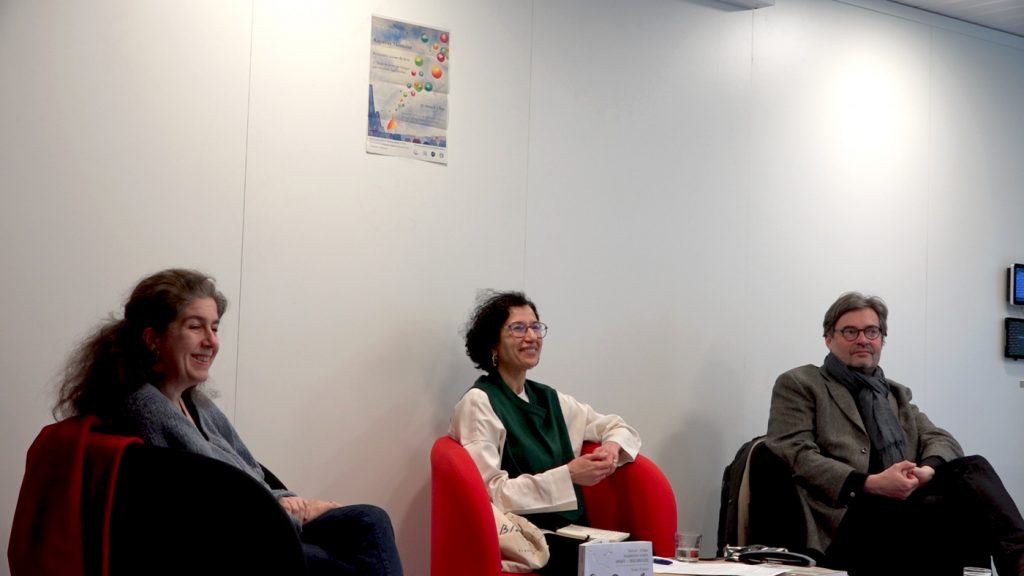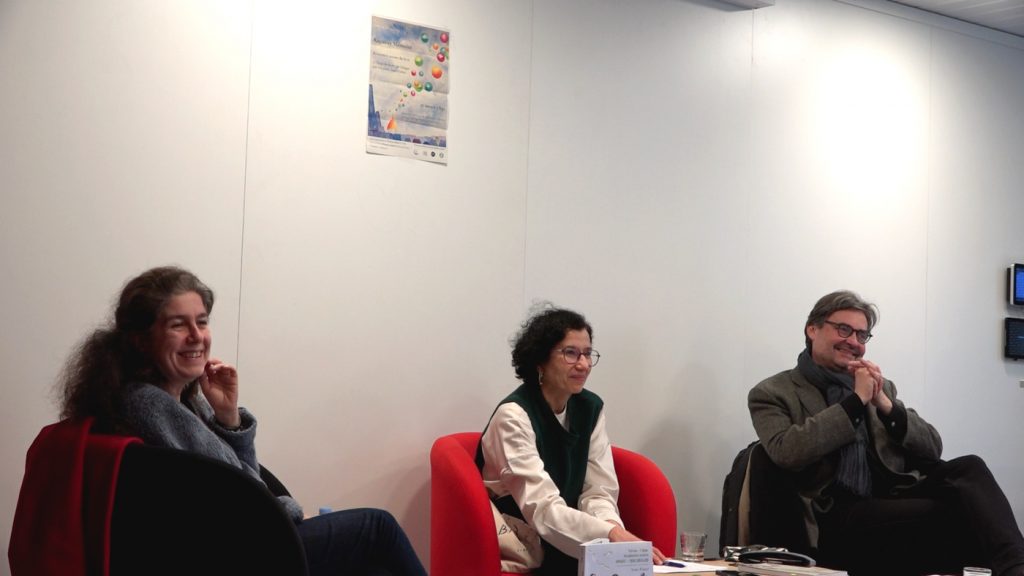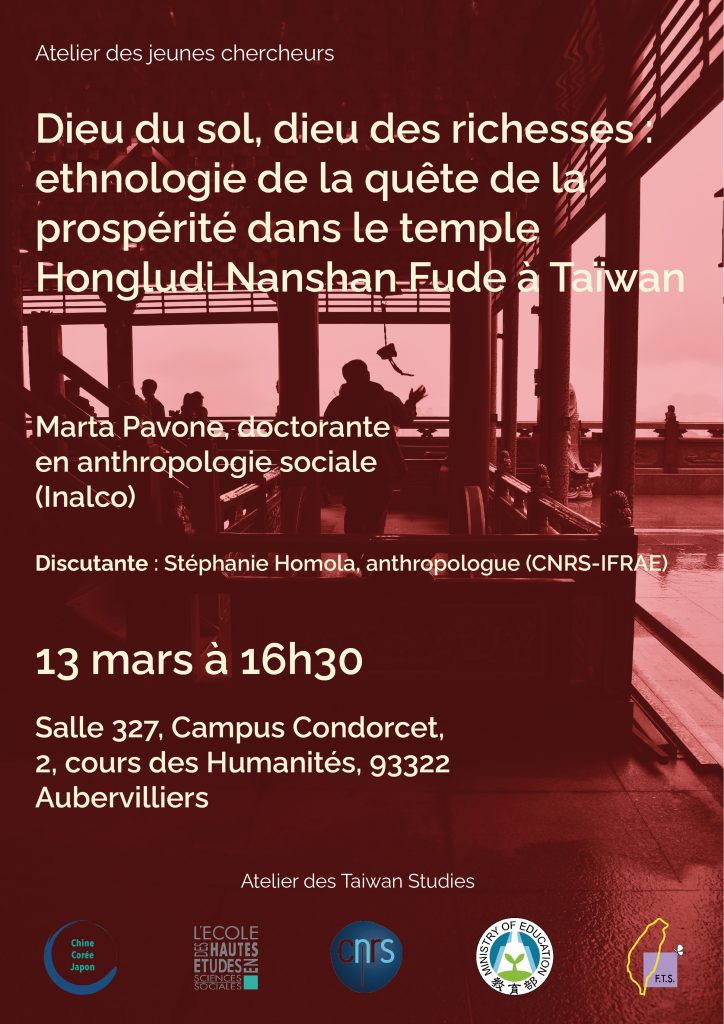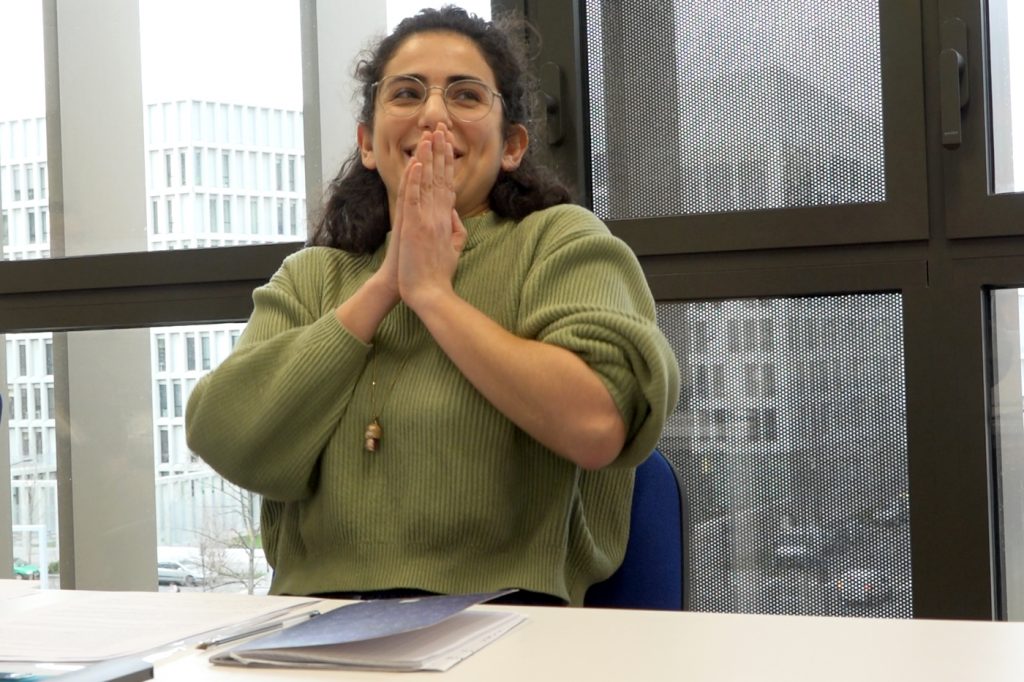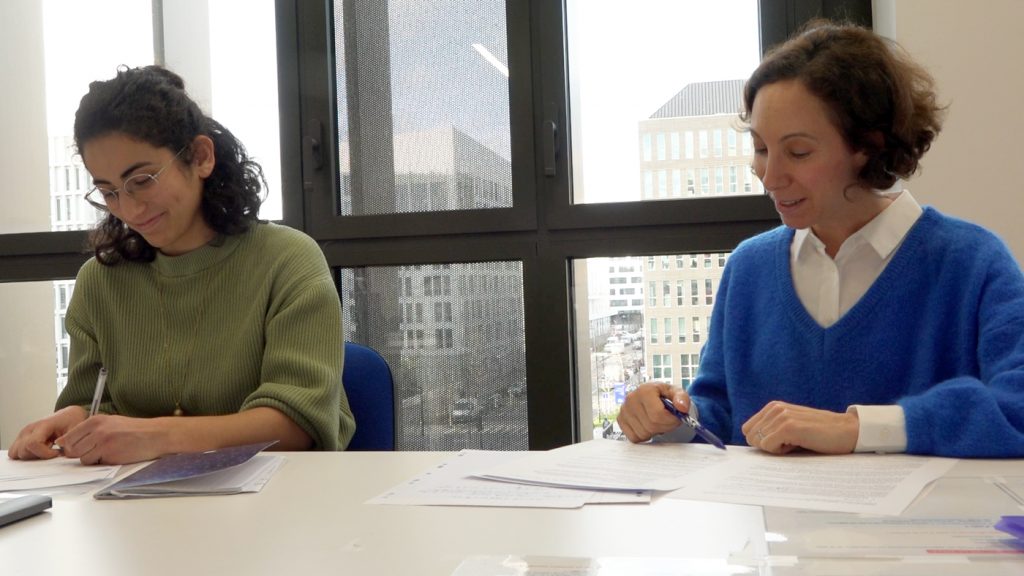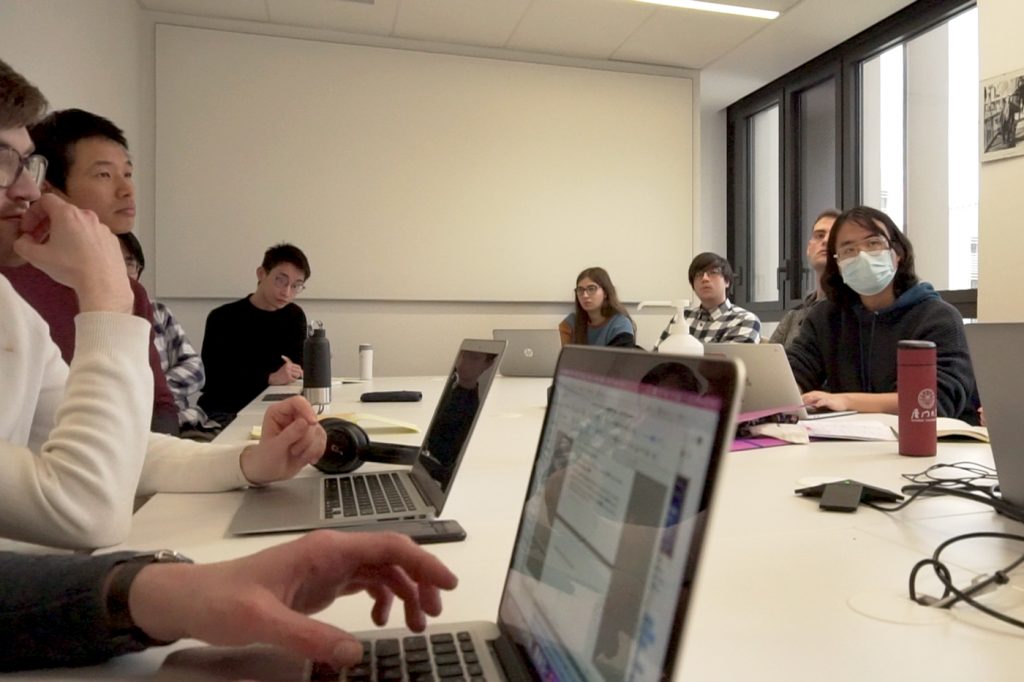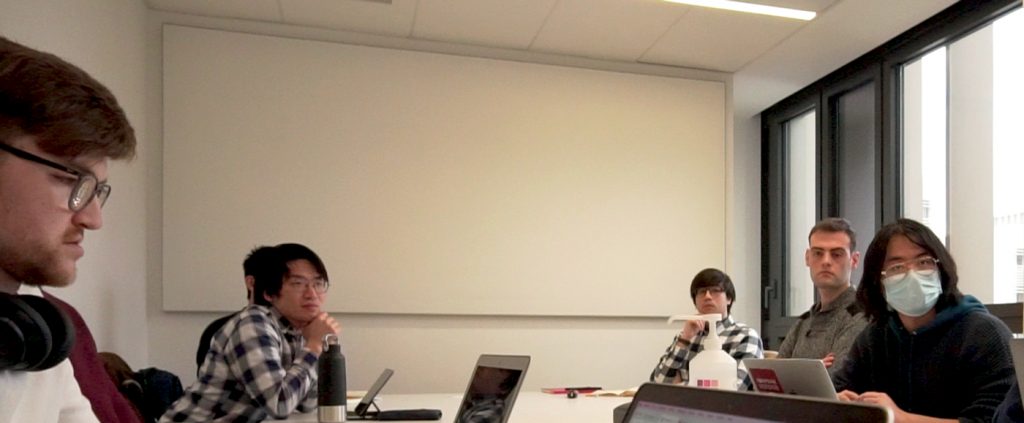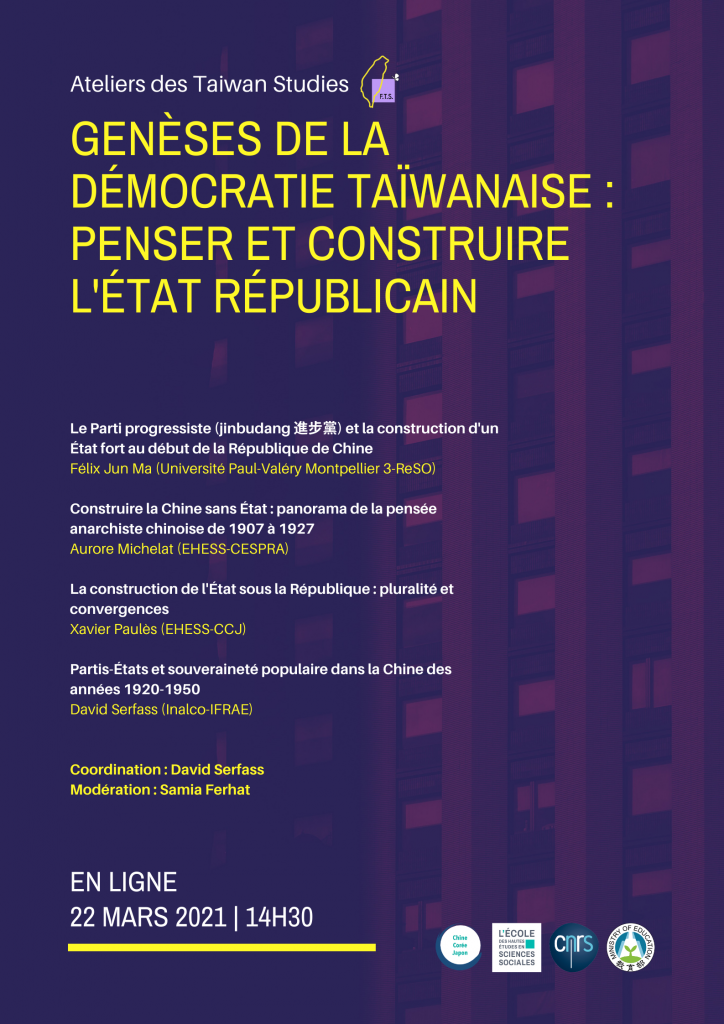Taiwan Studies Workshops
The Taiwan Studies Workshops are a new space for reflection that aims to bring together young and more established researchers around a specific theme in Taiwan studies.
Life histories and stories from Taiwan
Huang Jen-An
Translate by : Tu Tsao-Yin
Monday 3 June
17h Room AS1-08 EHESS, 54 boulevard Raspail, 75006 Paris
Huang Jen-An was born in 1942, and was graduated from the Department of Law of National Taiwan University in 1964. He went to Japan in 1967 and entered the Graduate School of Law of Kobe University the following year, specializing in the study of international regulations related to container transportation.
After completing his studies in Japan, he returned to Taiwan in 1970. Soon he joined the Ministry of Transportation and Communications and was engaged in shipping and container planning. He later resigned from public office and started his own business-CTW Logistics Corporation in 1974.
Conceived with the notion of “Thank for the love from parents and give back to all in the local community,” Mr. Huang donated to establish the CTW Culture and Education Foundation in 1998. Over the past 25 years, the foundation has sought to advocate social charity in education and culture, environmental protection and industrial development in conjunction with government resources with a focus on local residents, social groups, environment and industry. It also translates the ideal into concrete and incremental actions to materialize the corporate philosophy of CTW Logistics in “Give back to society, Give back to the Earth.”In the future, the foundation will align with social change to further commit its resources to social charity in the aspects of culture and education in diversity.
King Cheng in ancient sources: the construction of a commemorative character
Judicaël Perigois PHD student EPHE - CRCAO
Discussant : Alexis Lycas
Associate professor and Researcher (EPHE - CRCAO )
Monday 29 April
16.30
EHESS-Condorcet Building
Room A327
EHESS, 2 cours des humanités 93300 Aubervilliers
The Western Zhou dynasty (1045 to 771 BC) is considered a golden age in Chinese historiography. Confucius, in particular, made many references to this period, mentioning Kings Wen and Wu, the founders of the dynasty, as well as the Duke of Zhou, King Wu’s brother. Thanks to his virtue, King Wen is said to have received the Mandate of Heaven, the right to rule. As for King Wu, he overthrew the Shang dynasty and formally established the dynasty. After his death, the Duke of Zhou acted as regent to King Wu’s heir, King Cheng, and was from then on regarded as the person who had enabled the consolidation of dynastic power. The figure of King Cheng, who reigned for several decades, remains somewhat less prominent. My research aims to show how King Cheng was evoked as a historical figure in ancient sources, especially from the time of his reign up to the Han dynasty (2nd century BCE-2nd century CE), in different ways depending on the context in which these sources were produced. My study aims to reassess the significance of King Cheng’s reign in the memory of ancient China.
Presentation of the half-day conference
Monday 26 June 2023
4:00 pm to 6:00pm, Forum de la Maison des Sciences de l’Homme, 1st floor, EHESS, 54, Boulevard Raspail, 75006 Paris
Pictures of the event
Since 2017, the seminar dedicated to Taiwan and its Places of Memory has been examining Taiwan’s process of affirming its identity as well as its cultural and memorial roots. For Pierre Nora, “realms of memory are not what we remember, but rather the point where memory operates”. Thus, by focusing on how Taiwanese actors are operating on their own memory, we looked into the debates around historical, cultural and identity legitimacy in the constitution of a “common”. As Maurice Halbwachs argued, posing the question of the “social frameworks of memory” ultimately means questioning what binds us together as a group. What stories do we pass on? What narratives do we construct? What emotions do we mobilise? Which protagonists do we remember? Whom do we address? With what words, in what languages, through which reference points?
This year, we approached the issues of memory in Taiwan through the prism of bond, to which we added the terms space and distance. However, these terms ought not to be apprehended as mere spatial and geographical categories. Whether material, social or symbolic, space is a locus where meaning and significance are produced. The dynamics of memory that traverse it and operates on it construct the near and the far, the ‘us’ and the ‘others’. A fourth term emerges from this triptych of ‘bond, space, distance’: the boundary that delimits the space, constructs the distance, and is traversed by the bond.
Our lines of questioning mobilised have been wide-ranging and the terms polysemous. This is a deliberate choice, in order propose a common reflection based on what is concrete: our fieldwork (whether geographical or textual, in Taiwan or elsewhere). Thus we discussed the Waishengren people’s link to their homeland, the boundary between sacred and profane spaces in the Ba Jia Jiang ritual, or broadened our horizons by thinking Koreans’ bonds with and distance from Kazakhstan.
For this half-day conference, the students enrolled in the seminar will take the floor and explore these issues. What spaces are investigated? What borders are observed? What bonds are forged t and how are they maintained? What distances do these bonds traverse? What narratives and memories are mobilised? How can the construction of a ‘common’ be observed?
The objective is to set up a benevolent setting where the reflection on these issues, in the light of our own fieldwork and in the presence of our colleagues and established researchers, may be stimulated. However, the question of the bond should not be confined to Taiwan. This workshop is also intended to de-compartmentalise our work and make it accessible to those interested in Formosa, and will therefore be open to the wider public.
Guest researchers: Stéphanie Homola (CNRS), Vincent Goossaert (EPHE), Jérôme Soldani (Université Montpellier 3), Xiaohong Xiao-Planes (Inalco), Beatrice Zani (McGill University).
Organisers: Luc Castaneda and Wang Xihao, with Samia Ferhat.
Panel 1
2.00 pm – 3.30 pm
Same-sex marriage rituals in Taiwan: the initial stages of a survey
Nausica Rivière, doctoral student (IFRAE – INALCO)
From monolingualism to multilingualism: democracy in Taiwan’s language policies
Chen Shen-Bin, doctoral student (Université Sorbonne Nouvelle)
Coffee break
3.30pm – 4pm
Panel 2
4pm – 6pm
Diplomacy and missionary strategy of the Holy See towards the Republic of China from 1928 to 1946
Father Landry Védrenne, doctoral student (FASSE, Institut Catholique de Paris)
The Bodhisattvas of the 13th arrondissement: Tzu Chi, from Taiwan to Paris and from Paris to Taiwan
Luc Castaneda, Master 2 in Asian Studies (EHESS)
A discussion on the issue of “Narratives and memory” with Évelyne Ribert and Sébastien Ledoux, based on the book Le Temps des mots, un dialogue sino-taïwanais
Monday 27 March 2023
5:30 pm, Forum de la Maison des Sciences de l’Homme, 1st floor, EHESS, 54, Boulevard Raspail, 75006 Paris
Pictures of the event
An Introduction to Le Temps des Mots, un dialogue Sino-Taïwanais by Sociologist Évelyne Ribert (CNRS – IIAC/LACI)
“In France and other places across the world, Chinese and Taiwanese students happen to meet. They are keen to make better acquaintance but at the same time they feel some embarrassment due to the profound sense of otherness. They gain awareness of their divergent representations of each other: the Chinese evoke the belonging they share with the Taiwanese, whereas the latter point up to the “rift”; separating them. They are here observed by their professor, a specialist of Taiwan, who set up a workshop where the roles played by official, institutional and family memories in their identification dynamics have been probed. The discussions unfurled within the framework of an original research project — conducted in 2009 and 2010, involving ten participants — which was based on the screening of films looking into the Chinese and Taiwanese pasts (…). More specifically, this book explores family memories spanning two, three or even four generations and, in the process, it exposes the collective social frameworks of memory. Pieced together from 2009 until 2021, these are the memories of the generation born in the 1980s, at a time when democracy was established in Taiwan and the Chinese government urged its people to seek prosperity.”
This meeting is part of the Taiwan Studies Workshops. It will bring together the author Samia Ferhat, as well as Évelyne Ribert (CNRS – IIAC/LACI) and Sébastien Ledoux (University of Paris I – Panthéon-Sorbonne) around the theme « Récits et Mémoire ».
God of the soil, god of riches: ethnology of the quest for prosperity in the Hongludi Nanshan Fude temple in Taiwan
Monday 13 March 2023
4:30 pm, Room 327, Bâtiment de recherche de l’EHESS, Campus Condorcet, 2, cours des Humanités, 93322 Aubervilliers
Pictures of the event
The Hunglodei Nanshan Fude Temple (Hongludi Nanshan fude Gong 烘爐地南山福德宮) is one of the most famous places of worship today in Taiwan for the quest for wealth (qiu cai 求財). Located in Nanshijiao Mountain (Nanshijiao shan 南勢角山) in Chungho District (Zhonghe qu 中和區) in New Taipei.
The Hongludi Nanshan Fude is dedicated to Tudi Gong 土地公, the god of the soil. Tudi Gong is considered to be the deity in charge of protecting a human group settled near its anchorage place. Given his power related to the land occupied and exploited by humans, previous studies on the cult of Tudi Gong have focused on the relationship between the cult and the notion of space. Tudi Gong was defined as a “deity of Place” (Henri Maspero, 1971: 127) operating in a small-scale administrative context – the neighbourhood of a city, villages in rural areas (Henri Doré, 1995: 864). In Taiwan, the Taiwanese ethnologist Lin Mei-Jung 林美容 (1987) had considered Tudi Gong as the cult for understanding the social structure of a village. On the other hand, Alessandro Dell’Orto (2002: 25), in a comparative study of the different cases of Tudi Gong worship in Taiwan and the relationship with the cult space, had found that the multitude of altars in his name and the local legends contributed to constructing the meaning of the god’s action space according to its actors.
Indeed, although place is a fundamental connotation of this cult, Tudi Gong is also considered as a god of wealth. This connotation is linked to the cult’s relationship to the land, conceived as the source of its power and the symbolic carrier of fertility and abundance. According to my interlocutors, Tudi Gong is the “most ancient god of wealth” (zui lao de caishen 最老的財神), because “if there is the land, there is also wealth” (youtuyoucai 有土有財). However, how do we define this concept of wealth in relation to the Tudi Gong cult? Hongludi Nanshan Fude is mainly known for the quest for material prosperity based on personal enrichment. However, is the quest for prosperity in this place of worship today only about enrichment through an accumulation of economic capital or is it a multi-faceted wish that touches the sphere of the applicant’s daily life, namely the attainment of family and work happiness and status in the social environment to which he belongs?
This session inaugurates a new space within the Taiwan Studies Workshops: the Young Researchers’ Workshop. Marta Pavone, a doctoral student in social anthropology at Inalco, will present her research work conducted in the heart of the Hongludi Nanshan Fude temple in Taiwan. This temple is dedicated to Tudi Gong 土地公, the god of soil. Marta Pavone’s presentation will be discussed by Stéphanie Homola, anthropologist, researcher at the CNRS – IFRAE.
Geneses of Taiwanese democracy: thinking and building the Republican State
Monday 22 March 2021
2:30-5:30 pm, online
The ongoing formation of a truly Taiwanese nation-state is accompanied by an increasing autonomy of Taiwan studies. We can only welcome this development, which has made it possible to understand the political and social dynamics of the island in all their plurality by emancipating itself from a Sinocentric reading. Nevertheless, contemporary Taiwanese society is partly based on a political framework that was formed on the mainland before 1949, and it is therefore essential to examine this framework in order to understand the democratisation that has been taking place since the 1980s.
The aim of this workshop is to offer students working on Taiwan an overview of the different ways in which the republican state was conceived and constructed in China before 1949. In contrast to a teleological interpretation of the transition from the Manchu Empire to the Chinese nation-state, the aim is to identify the successive responses to the paradoxical challenge of rebuilding a strong state while giving voice, at least in principle, to the sovereign people.
Félix Jun Ma will attempt to reassess the first republican experience of the 1910s through the case of the Progressive Party (jinbudang), situated at the hinge between the aborted attempt at a parliamentary monarchy and the subsequent efforts to institutionalise a strong state through law. However, the state was not the only possible horizon for thinking about the transformation of society, as Aurore Michelat will explain in relation to the Chinese anarchist movements between 1907 and 1927. Through the neglected contribution of the warlords to this transformation, Xavier Paulès will question the relevance of the still prevalent narrative according to which the modernisation of the republican state took place despite the centrifugal and external forces threatening it. Finally, David Serfass will show how the advent of party-states at the end of the 1920s led to a rethinking of the relationship between the strong state and democracy, thus founding the framework in which Chinese society is still evolving today and against which its Taiwanese neighbour is now trying to build its own model.
“The Progressive Party (jinbudang 進步黨) and the construction of a strong state in the early Republic of China”
Félix Jun Ma (Université Paul-Valéry Montpellier 3-ReSO)
“Building China without a state: a panorama of Chinese anarchist thought from 1907 to 1927”
Aurore Michelat (EHESS-CESPRA)
“The construction of the State under the Republic: plurality and convergences
Xavier Paulès (EHESS-CCJ)
“Partis-States and popular sovereignty in China from 1920 to 1950
David Serfass (Inalco-IFRAE)
